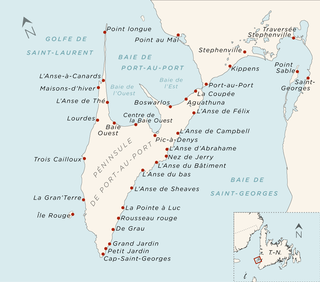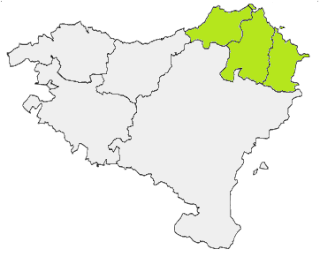Basque may refer to:
Contents
- Basques, an ethnic group of Spain and France
- Basque language, their language
Basque may refer to:
The Basques are a Southwestern European ethnic group, characterised by the Basque language, a common culture and shared genetic ancestry to the ancient Vascones and Aquitanians. Basques are indigenous to, and primarily inhabit, an area traditionally known as the Basque Country —a region that is located around the western end of the Pyrenees on the coast of the Bay of Biscay and straddles parts of north-central Spain and south-western France.

In Spain, an autonomous community is the first sub-national level of political and administrative division, created in accordance with the Spanish Constitution of 1978, with the aim of guaranteeing limited autonomy of the nationalities and regions that make up Spain.
Euskadi is Basque language for the Basque Country, an autonomous community in northern Spain.

The Basque Country is the name given to the home of the Basque people. The Basque Country is located in the western Pyrenees, straddling the border between France and Spain on the coast of the Bay of Biscay. Euskal Herria is the oldest documented Basque name for the area they inhabit, dating from the 16th century.
The culture of Spain is influenced by its Western origin, its interaction with other cultures in Europe, its historically Catholic religious tradition, and the varied national and regional identities within the country. It encompasses literature, music, visual arts, cuisine as well as contemporary customs, beliefs, institutions, and social norms.

Newfoundland French or Newfoundland Peninsular French, refers to the French spoken on the Port au Port Peninsula of Newfoundland. The francophones of the region can trace their origins to Continental French fishermen who settled in the late 1800s and early 1900s, rather than the Québécois. Some Acadians of the Maritimes also settled in the area. For this reason, Newfoundland French is most closely related to the Norman and Breton French of nearby St-Pierre-et-Miquelon. Today, heavy contact with Acadian French—and especially widespread bilingualism with Newfoundland English—have taken their toll, and the community is in decline.
Red Bay is a fishing village in Labrador, notable as one of the most precious underwater archaeological sites in the Americas. Between 1530 and the early 17th century, it was a major Basque whaling area. Several whaling ships, both large galleons and small chalupas, sank there, and their discovery led to the designation of Red Bay in 2013 as a UNESCO World Heritage Site.
Cantabrian or Cantabrians may refer to:

Euskal Irrati Telebista is the Basque Autonomous Community's public broadcast service, which broadcasts throughout the Basque Country. Its main brand is Euskal Telebista.

The French Basque Country, or Northern Basque Country, is a region lying on the west of the French department of the Pyrénées-Atlantiques. Since 1 January 2017, it constitutes the Basque Municipal Community presided over by Jean-René Etchegaray.
Creole may refer to:

Basque Country may refer to:

Both the perceived nationhood of Spain, and the perceived distinctions between different parts of its territory derive from historical, geographical, linguistic, economic, political, ethnic and social factors.
Valentino may refer to
Catalonia is part of the Iberian Peninsula in the Mediterranean Sea.

The following outline is provided as an overview of and topical guide to Spain:

The Basque Country, also called Basque Autonomous Community, is an autonomous community in northern Spain. It includes the Basque provinces of Álava, Biscay, and Gipuzkoa. It also surrounds an enclave called Treviño, which belongs to the neighboring autonomous community of Castile and León.

The ikurrina flag or ikurriña is a Basque symbol and the official flag of the Basque Country Autonomous Community of Spain. This flag consists of a white cross over a green saltire on a red field.
Aragonese or Aragones may refer to:
Tourism in the Basque Autonomous Community has increased considerably in recent years, and is a popular destination for tourists from Spain and France. According to data from the Eustat the number of tourists entering the region in the year 2009 was 1,991,790, with the final result still pending. 71% of the yearly visitors come from the rest of Spain; the greatest number from Madrid Autonomous Community (14.2%), and Catalonia (11.1%). International visitors make up the remaining 29% - the largest percent come from France (7.2%). 62% of the people who come to the Basque Autonomous Community visit one of the three capitals, 27% visit inland and 11% visit the coast. The average stay of the visitors is 2 days.